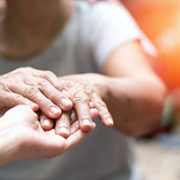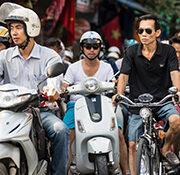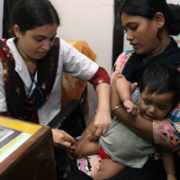Archive | Health RSS feed for this section
Economics, Finance sector development, Health
 Health, Poverty, Social development and protection
Health, Poverty, Social development and protection
 Health, Information and Communications Technology, Population
Health, Information and Communications Technology, Population
 Health
Health
 Health, Water
Health, Water
 Economics, Education, Health
Economics, Education, Health
 Economics, Education, Environment, Health, Population, Social development and protection, Urban development
Economics, Education, Environment, Health, Population, Social development and protection, Urban development
 Gender, Health
Gender, Health
 Health
Health
 Health
Health

The costs of being overweight and obese in Asia and the Pacific

Increased prosperity in Asia and the Pacific has led to lifestyle changes with unwanted impacts. Studies have shown that as a result of economic progress, regions are shifting to a diet that is linked with noncommunicable diseases (NCDs), particularly overweight and obesity. The World Health Organization estimates for 2015 show that about 15 million people aged 30–69 years die annually because of NCDs (Waqanivalu 2018).
Is Indonesia’s subsidized rice program benefitting its children?

Indonesia’s subsidized rice program, RASKIN (also known as Operasi Pasar Khusus), constitutes the longest running and the largest in-kind transfer for poor households in Indonesia. In 2010, government expenditure on RASKIN accounted for 53% of the total household-targeted social assistance. What has been the impact of this program on child health in Indonesia? Our recent paper (Gupta and Huang 2018) is, in this regard, the first attempt in the literature to analyze this issue in the context of Indonesia.
Piecemeal Policy Approaches to Aging Societies: Can They Be Avoided with Proper Data on Well-Being?

The rapid pace of aging in developed and developing countries, especially in Asia, requires data for informed decision-making to ensure the well-being of aging populations. But for many countries, data for sound policy-making, planning, and investment targeting have not been available. This has led to piecemeal public policies with little sense of priority.
The Economic Burden of Overweight and Obesity Reaches 3% of GDP in Indonesia

Overweight and obesity are on the rise in Indonesia. The results of the Basic Health Survey, a national, community-based survey that measures body mass index (BMI), for 2007, 2010, and 2013 show the rising prevalence of overweight and obesity in Indonesia. Several combining factors increase overweight and obesity. These include the consumption of energy-dense food, the intensive advertisement of unhealthy food, and the consumption of unhealthy school meals.
What can countries in Asia learn from the Republic of Korea and Malaysia about sanitation and its economic impacts?

In 2014, when I first moved to the Republic of Korea from India, I was impressed and awestruck by the country’s infrastructure and ease of mobility. Being an architect, the aspect I found most endearing of the city-wide master planning was the access and provision of toilets almost everywhere, be it at metro train stations, bus terminals, shopping plazas, parks, or even on mountain hikes. The convenience of having clean and hygienic toilets in public places was truly a gift for me during my stay there for a few years.
Obesity in Pacific Island countries and territories: How big a problem is it?

The Pacific Island region is made up of 22 island countries and the territories of Polynesia, Micronesia, and Melanesia. There is great cultural diversity in the region, with about 1,200 languages spoken and a variety of exotic cultures. Surrounded by the vast Pacific Ocean, the land mass of the countries varies considerably.
Pointers from Asia for urbanization in Africa

Africa and Asia are latecomers to urbanization. In these two continents, less than half live in urban centers, while elsewhere, more than 70% of people do. But Africa and Asia are now rapidly urbanizing, with Asian cities growing at an average of 1.5% per year and Africa’s at 1.1% per year.
Economic impacts of obesity in the Republic of Korea

Obesity is a state of excessive body fat accumulation and is difficult to measure. Body mass index (BMI)—defined as weight in kilograms divided by the square of height in meters—has been used traditionally for its simplicity and the availability of data. Although shortcomings of using BMI have been acknowledged, its correlation with body fat percentage and its sensitivity in diagnosing obesity based on the body fat percentage have been verified for Korean people (Chung et al. 2016).
The cost of being obese

When we talk about the cost of being obese, many people will imagine the personal spending due to obesity, e.g. special clothing, housing, and transportation that may be different from the requirements of non-obese people, or even the medical expenses arising from obesity-related illnesses. Some people may also consider the cost of becoming obese, such as excessive consumption of high-calorie foods and sweetened beverages.
Innovation in health care in South Asia

The countries comprising the South Asian Association for Regional Cooperation (SAARC) region (India, Pakistan, Bangladesh, Nepal, Bhutan, Afghanistan, Sri Lanka, and the Maldives) commonly known as South Asia face serious healthcare affordability and accessibility challenges. According to World Bank national estimates, South Asian countries houses more than 390 million poor people and a very significant percentage of total population lies below national poverty line (Figure 1). This large number of population is quite unlikely to afford private healthcare services and heavily dependent on the public healthcare facilities.


Search
Subscribe / Connect to Asia Pathways
Subjects
- Agriculture and natural resources
- Blog
- Capacity development
- Climate change
- Economics
- Education
- Energy
- Environment
- Finance sector development
- Gender
- Governance and public sector management
- Health
- Industry and trade
- Information and Communications Technology
- Infrastructure
- Miscellaneous
- Population
- Poverty
- Private sector development
- Regional cooperation and integration
- Sanitation
- Social development and protection
- Transport
- Uncategorized
- Urban development
- Video Blog
- Water
Recent Posts
- Unraveling the Health Risks of Climate Change
- Linking Farmers to Markets Through Agricultural Cooperatives and E-Commerce in Asia
- How Can Governments Support Electricity Distribution to Achieve Net Zero in Asia?
- Promoting Corporate Climate Action Through Greenhouse Gas Accounting
- Evaluating G7 Commitments on Climate Change, Health, Well-Being, and Agriculture




Recent Comments